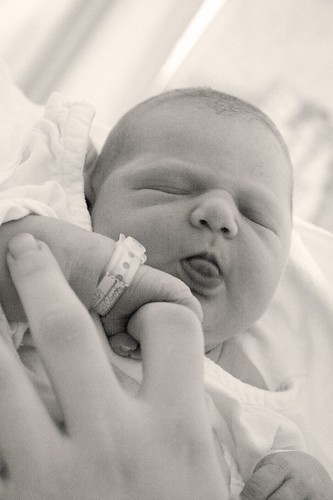 | |
| Questions about our timing? |
| How your baby's growing: Your baby is no longer an embryo! Though she's barely the size of a kumquat — just an inch or so long, crown to bottom — and weighs less than a quarter of an ounce, she now has completed the most critical portion of her development. This is the beginning of the so-called fetal period, a time when the tissues and organs in her body rapidly grow and mature. Her vital organs — the liver, kidney, intestines, brain, and lungs — are now in place and starting to function (although they'll continue to develop throughout your pregnancy). Her liver continues to make blood cells, and the yolk sac, which previously supplied these cells, is no longer needed and begins to disappear. During the next three weeks, your baby's length will more than double to nearly 3 inches. Her head is proportionately smaller now than it was a few weeks ago, but it's still almost half the length of her entire body. Her forehead temporarily bulges with her developing brain and sits high on her head; it will later recede to give her a more human appearance. Each day, more minute details — including tiny fingernails, toenails, and peach-fuzz hair — start to appear on her body. Her fingers are now completely separated; her arms bend at the elbow and curve slightly; her hands are flexed at the wrist and meet over her heart; her legs are lengthening; and her feet may be long enough to meet in front of her body. She is busily swallowing amniotic fluid and kicking her legs. If you could take a peek at your baby this week, you'd be able to clearly see the outline of her spine through her parchment-thin skin. Spinal nerves are beginning to stretch out from her spinal cord. * Note: Experts say every baby develops differently — even in the womb. This developmental information is designed to give you a general idea of how your baby is growing. How your life's changing: Your uterus has doubled in size by now. Before you got pregnant, it was the size of a small pear. By this week, it's grown to the size of a grapefruit. At your next prenatal visit, you may be able to hear your baby's rapid heartbeat with the help of a Doppler, a hand-held soundwave stethoscope that your practitioner will pass over your belly. Many women say that the beating of their baby's tiny heart sounds like the thunder of galloping horses and hearing it for the first time is one of the greatest joys of the first trimester. Depending on your level of fitness, you can most likely participate in a wide range of activities during pregnancy. Swimming and walking are excellent choices for the whole nine months. Exercise promotes muscle tone, strength, and endurance — three qualities that can help you carry the weight you gain during pregnancy, prepare you for the physical stress of labor, and make it easier to get back into shape after your baby is born. (Unfortunately, there's no evidence that regular exercise shortens labor.) |

